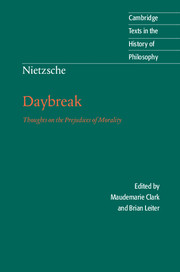Book III
Published online by Cambridge University Press: 05 June 2012
Summary
149
The need for little deviant acts. – Sometimes to act against one's better judgment when it comes to questions of custom; to give way in practice while keeping one's reservations to oneself; to do as everyone does and thus to show them consideration as it were in compensation for our deviant opinions: – many tolerably free-minded people regard this, not merely as unobjectionable, but as ‘honest’, ‘humane’, ‘tolerant’, ‘not being pedantic’, and whatever else those pretty words may be with which the intellectual conscience is lulled to sleep: and thus this person takes his child for Christian baptism though he is an atheist; and that person serves in the army as all the world does, however much he may execrate hatred between nations; and a third marries his wife in church because her relatives are pious and is not ashamed to repeat vows before a priest. ‘It doesn't really matter if people like us also do what everyone does and always has done’ – this is the thoughtless prejudice! The thoughtless error! For nothing matters more than that an already mighty, anciently established and irrationally recognised custom should be once more confirmed by a person recognised as rational: it thereby acquires in the eyes of all who come to hear of it the sanction of rationality itself! All respect to your opinions! But little deviant acts are worth more!
- Type
- Chapter
- Information
- Nietzsche: DaybreakThoughts on the Prejudices of Morality, pp. 95 - 130Publisher: Cambridge University PressPrint publication year: 1997

